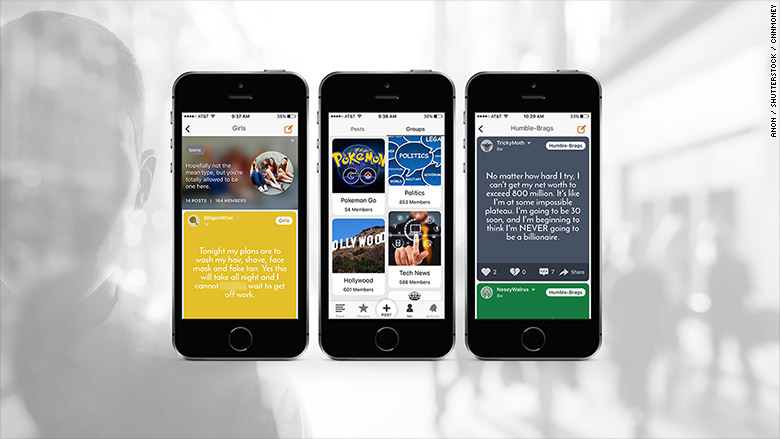
Have you ever wanted to share your real feelings about Yahoo's downfall, the Kardashians or the Second Amendment, but were too scared to do it under your real name?
There is yet another anonymous social app that wants to let people speak their mind without worrying about pesky repercussions.
Launching Thursday, Candid is an iOS and Android app created by former Google (GOOG) engineers Bindu Reddy and Arvind Sundararajan, who also run social media ad company MyLikes.
On social networks where you use your real name, like Facebook (FB) and sometimes Twitter (TWTR), people have to censor themselves, says Reddy. But the team wanted to create a space where people don't have to be neutral.
"There is a need for being able to ... tell people how you feel, and have discussions about news and options without having negative consequences," said Reddy.
Related: 20 million people are sharing secrets on this app
It's not an original idea. Silicon Valley is strewn with the corpses of dead anonymous social networks like Secret, PostSecret and Rumr. Many were unprepared to deal with the large volume of toxic posts and bullying that come with the territory.
The app's design borrows heavily from Secret. Each post is featured as a brightly colored square, and people are represented by small animal icons, such as a hedgehog.
Someone posts a deep thought ("In God we Trust -- how do you feel about this sentence?") and other people can like, dislike or comment ("Religion Sucks," reads one reply).
The biggest design difference is that it divvies up conversations into groups. It suggests these groups based on data pulled from your Facebook profile (you can also use a phone number to log in). There are groups for PokemonGo, Google, Taylor Swift, race issues, guns and startups. Anyone can create a new group, so the somewhat awkward, Silicon Valley-centric focus could shift after the app's public launch.
More than 600 people have been testing out the beta version of the app, but the tone has remained civil, if a bit dull. The company is bracing itself to deal with the darker side of full anonymity.
To start, Candid is relying on artificial intelligence, community policing and outsourcing to moderate conversations. Software scans the user-generated posts to make sure they're on topic. If it detects a statement it can't confirm as true, it marks it as a rumor. That adds True/False buttons to the post, so other users can weigh in. If something sounds like slander or hate speech, the system will remove the post.
Meanwhile, anyone is able to flag a post they find problematic, which a team of ten contractors in India will review individually. Over time, the app will give people badges based on their past posts, labeling them as a positive person, an influencer, a hater or a gossip, for example.
Related: Twitter permanently removes Milo Yiannopoulos from its platform
Even with custom software and built-in checks to catch negative posts, Candid will have to learn as it goes. Reddy said the company plans to automatically delete any posts about self-harm or suicide. But when asked if that was the best way to handle serious mental health issues, she said they might rethink that approach.
Contrary to every internet comments section, Reddy thinks giving people the freedom to say what they really think can actually help people have more productive conversations about politics. Unlike Facebook, people (in theory) are freed from the echo chamber and can talk about Trump or guns with rational strangers.
And if those conversations take a turn, Candid's betting on the community and some artificial intelligence to clean things up.

